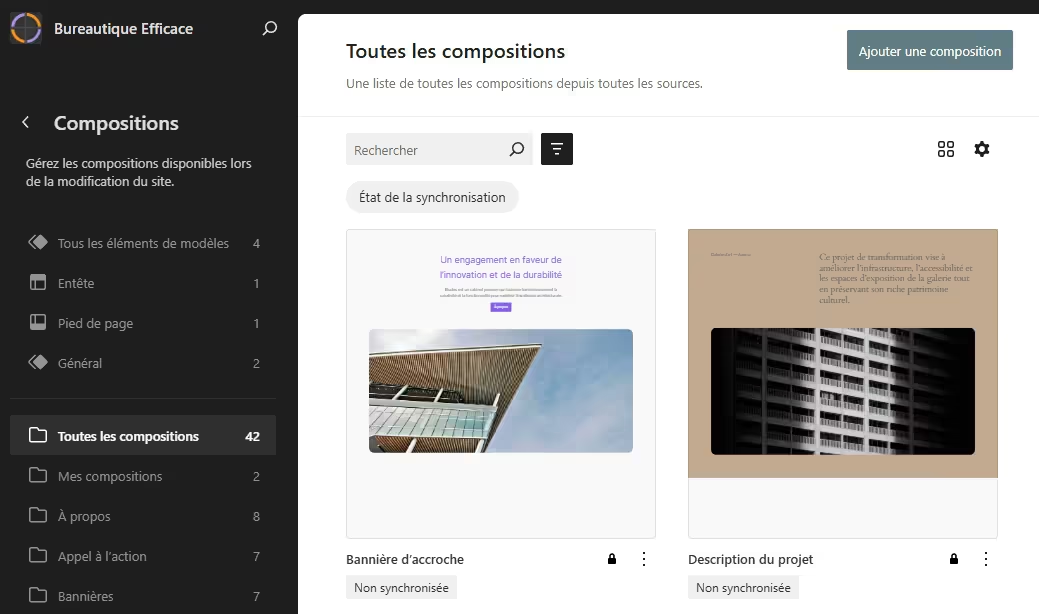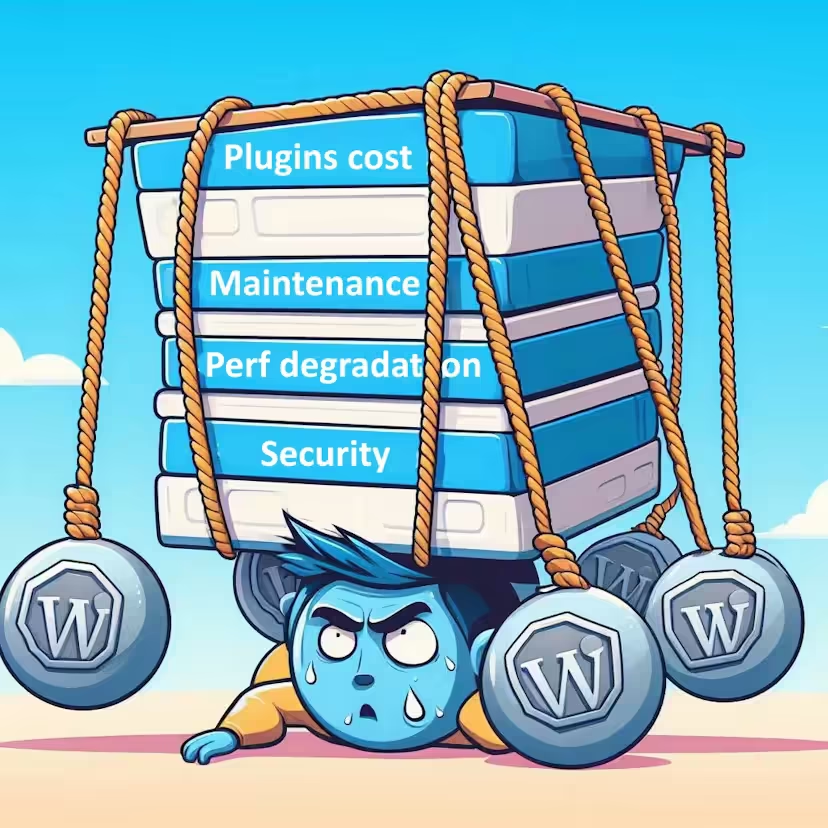In this article, I’ll share why I chose the Eleventy framework to create this blog, even though I’m a big fan of WordPress. Along the way, you’ll see the major advantages of static sites over WordPress. Let’s dive in!
The WordPress journey
A rich ecosystem
To create a WordPress site, you need three essentials: a PHP server, a MySQL database, and a theme. But plugins quickly become indispensable for handling many aspects of the site:
- Maintenance and security: Backups and restorations of files and the database.
- SEO optimization: Sitemap generation and SEO tweaks.
- Advanced blocks: Table of contents, popups, forms, etc.
- Performance optimization: Bundling, caching, image compression...
- Multilingual support.
- ...and more.
WordPress’s ecosystem is impressively vast—it’s rare to find a need not covered by a theme or plugin! This richness is a key reason for WordPress’s success.

The FSE revolution
Since version 6.2 (released in 2023), WordPress allows full-site customization using Gutenberg, its default editor. Headers, footers, menus, sidebars—everything can now be edited with Gutenberg, provided you use a compatible theme. This is called FSE (Full Site Editing), a still-evolving but already powerful technology.

I think this is fantastic because:
- For advanced, custom layouts (like homepages), you no longer need third-party page builders like Divi or Elementor. Gutenberg alone suffices.
- Theme choice matters less if it’s FSE-compatible. You can always tweak elements with Gutenberg, so themes save time without limiting creativity.
- FSE reduces plugin reliance, making sites lighter and faster.
- It’s still user-friendly. Despite the many components and options, I quickly got the hang of FSE.
My site bureautique-efficace.com previously used the OceanWP theme and Elementor. I rebuilt it entirely with FSE (WordPress’s 2024 theme) and just 7 plugins. The result? A much faster and simpler-to-maintain site!
So, is WordPress + FSE the perfect solution?
The flip side
Despite FSE’s progress, many plugins remain essential for the needs listed earlier—and this brings problems:
- Plugins that affect page rendering often slow down the site.
- Themes and plugins are potential security vulnerabilities.
- Finding and testing the right plugins for niche needs can be tedious.
- The best themes/plugins are usually paid, with expensive annual subscriptions.
- While plugins cover almost every need, cobbling them together can’t match the customization and performance of integrated solutions.
As a developer and trainer, I’d rather invest time in honing my technical skills than testing and tweaking plugins...
What pushed me to explore alternatives
I’ve often been frustrated by plugin dependency and their costs. When I decided to create this blog, I searched for the best multilingual plugins—only to face familiar issues:
- Complexity: Analyzing and testing plugins is time-consuming (and their flaws are often hidden).
- Cost: The best plugins were pricey.
- Performance/maintainability: How would these plugins impact my site?

I was growing weary but saw no alternatives. I assumed building a blog without WordPress would be tedious, like reinventing the wheel—with inferior results.
I was wrong.
I’d overlooked frameworks that create lighter, faster, and more customizable static sites than WordPress.
Discovering Eleventy
While reading an article on Gui Ferreira’s blog (a "minimalist software craftsman"), I wondered:
"His blog looks sleek and unlike WordPress. What’s it built with?"
The footer read: "Powered by 11ty." Never heard of it...
Curious, I clicked the link and landed on a quirky homepage featuring a bespectacled opossum floating with a balloon! :-)

The page title: "Eleventy is a simpler static site generator."
Key points caught my eye immediately:
- Edit pages in Markdown (a developer’s dream!).
- Blazing-fast HTML generation.
- Total control over the output.
- No forced JavaScript framework dependencies.
Wow—this spoke to me! I had to learn more.
First, I researched static sites. In short, they’re sites where pages are generated before deployment, not dynamically per request.
Static sites offer huge advantages in performance, security, maintenance, and SEO!
Tip
For a deep dive into static sites, check out this article covering use cases, pros/cons, and how they’re built.
Eleventy seemed perfect: simple, performant, and the right tool for the job—no sledgehammers to swat flies!
But one concern lingered: static blogs can’t natively handle visitor comments. A bummer... until I found an elegant solution (coming in a future article). "Static" doesn’t mean "cut off from the world."
The verdict
WordPress is ideal for non-technical users who want to assemble pre-built bricks into a functional site. It’s almost playful, and quick results are rewarding.
With FSE, WordPress is moving in the right direction—more flexibility, better performance.
But for those comfortable with technical tinkering, static sites (and frameworks like Eleventy) offer more control, precision, performance, and independence from plugin vendors. They also solve niche needs without opening your wallet.
| Criterion | WordPress (FSE) | Eleventy (Static) |
|---|---|---|
| Ease of use | Very accessible, no-code | Requires technical skills |
| Customization | Highly flexible via FSE | Total, but manual |
| Performance | Good (plugin-dependent) | Excellent (pre-built pages) |
| Security | Plugin-dependent | Very high (no database) |
| Maintenance | Frequent updates | Local builds, minimal upkeep |
| Cost | Often paid plugins/themes | Free (excluding hosting) |
Personally, since mastering Eleventy, I’m hooked! Unless I have specific needs, WordPress is now off the table.